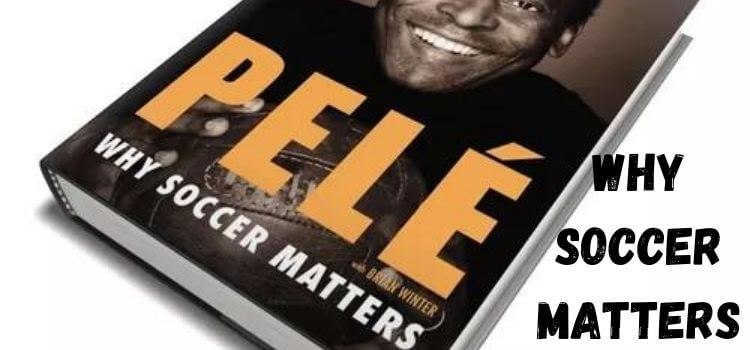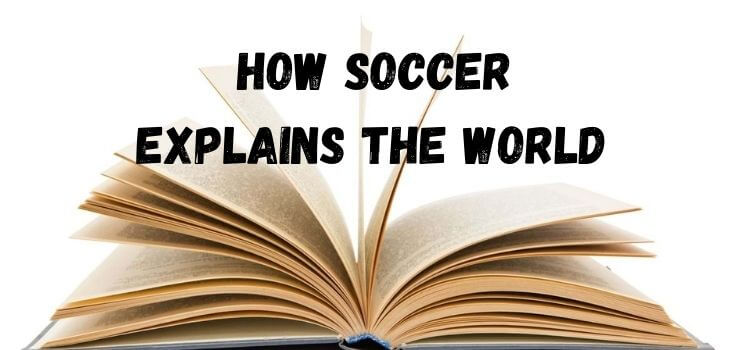As an Amazon Associate, I earn from qualifying purchases
“Why Soccer Matters” is more than just a book about a sport; it’s a heartfelt exploration of the world’s most beloved game by one of its greatest legends, Pelé. Soccer, or football as it’s known outside the U.S., is a global phenomenon that unites people across different cultures, religions, and economic backgrounds. In this article, we’ll delve into the essence of “Why Soccer Matters,” uncovering the profound insights Pelé shares about the beautiful game and its significance in our lives.

About the Author
Pelé, born Edson Arantes do Nascimento, is an icon in soccer. His illustrious career includes three FIFA World Cup victories with Brazil and over 1,000 career goals.
Beyond his on-field achievements, Pelé has been an ambassador for soccer, advocating for its power to foster global unity and peace. His passion for the sport and its impact on society inspired him to write “Why Soccer Matters.”
Summary of The Book “Why Soccer Matters”
“Why Soccer Matters” is a deeply personal narrative that intertwines Pelé’s life story with the broader history of soccer. The book “Why Soccer Matters” is structured to highlight significant moments in his career while reflecting on the sport’s evolution.
Key chapters discuss his early years in Brazil, his rise to international stardom, and reflections on soccer’s role in addressing social issues.
The Cultural Impact of Soccer
It’s common to refer to soccer as the world’s universal language. It transcends borders and brings people together in a way few other activities can.
Pelé illustrates this through vivid stories and examples, showing how soccer creates bonds among diverse communities, bridging cultural and linguistic divides.
Soccer and Personal Development
Pelé emphasizes the life lessons that soccer imparts. Discipline, teamwork, and resilience are core values nurtured by the sport.
Through personal anecdotes, Pelé demonstrates how soccer helped shape his character and can do the same for others, fostering growth both on and off the field.
Soccer’s Role in Social Change
“Why Soccer Matters” does a great job of examining how soccer may be a force for social change.
Pelé highlights how soccer can be a potent weapon in the fight against prejudice and injustice in his discussion of programs that use the game to promote social integration and equality.
Soccer and National Identity
Soccer plays a pivotal role in shaping national identity. Pelé recounts how Brazil’s World Cup victories united the nation and instilled a sense of pride.
He also examines other countries where soccer has become crucial to national identity, demonstrating its power to inspire and unify.
Economic Impact of Soccer
The economic implications of soccer are vast. Pelé discusses how the sport drives economic activity, from local communities to global enterprises.
The book provides insights into how soccer-related businesses contribute to economic development and the sport’s role in generating revenue and jobs.
Challenges in Soccer
Despite its many positives, soccer faces significant challenges. Pelé candidly addresses issues such as corruption, governance problems, and the commercialization of the sport.
He shares his thoughts on overcoming these difficulties while maintaining the competition’s integrity and spirit.
The Future of Soccer
Looking ahead, Pelé is optimistic about soccer’s future. He discusses emerging trends, including the role of technology in enhancing the game and improving fairness through innovations like VAR (Video Assistant Referee).
Pelé envisions a future where soccer continues to grow in popularity and influence.
Pelé’s Legacy
Pelé’s legacy extends far beyond his playing days. He has tirelessly advocated for the sport and its potential to drive positive change. Future generations will feel his many honours and recognitions, which reflect his contributions to soccer and society.
Reception of the Book
“Why Soccer Matters” has been well-received by critics and fans alike. It has been praised for its insightful and heartfelt storytelling, offering a unique perspective on soccer from one of its most excellent ambassadors.
Comparing it to other soccer fiction reveals how well it combines social insight and personal story.
Why Soccer Matters Today
“Why Soccer Matters”‘ fundamental ideas are still applicable today. Social integration, economic impact, and the fight against inequality remain pertinent in soccer.
Pelé’s reflections provide valuable insights into how the sport can address these ongoing challenges.
Conclusion
The book “Why Soccer Matters” is a testament to soccer’s profound impact on individuals and societies. Pelé’s reflections offer a deep understanding of why soccer is more than just a game—it’s a vital part of our cultural and social fabric. As we continue to navigate the complexities of the modern world, soccer’s ability to unite and inspire remains as crucial as ever.
FAQs
Pelé, born Edson Arantes do Nascimento, is a Brazilian soccer legend known for his exceptional skill and sportsmanship. Many consider him to be among the all-time best soccer players.
Pelé was inspired to write “Why Soccer Matters” to share his experiences and insights on soccer’s profound impact on individuals and societies, highlighting its potential to foster unity and drive social change.
The book discusses how soccer can be a powerful tool for social integration, promoting equality and diversity through various initiatives and personal stories from Pelé’s career.
Key takeaways include:
The universal language of soccer.
Its role in personal and social development.
The economic impact of the sport.
The ongoing challenges it faces.
Yes, the book’s exploration of broader social and cultural themes makes it accessible and engaging for readers who may not be avid soccer fans but are interested in the sport’s impact on society.
Read Our More Articles
- How Soccer Explains the World Book: An Odd Globalization Theory
- A Book About Soccer: Uncovering the Secrets of Soccer
- How to Play Soccer Book: A Comprehensive Guide
As an Amazon Associate, I earn from qualifying purchases


